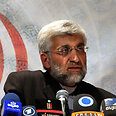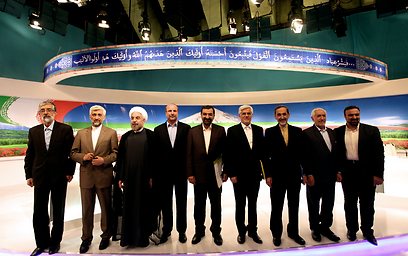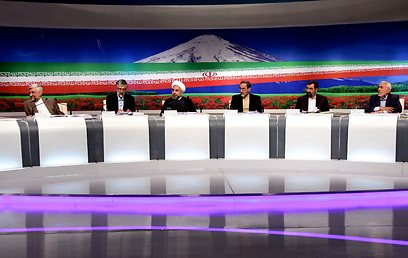
Presidential hopefuls clash on Iranian nuclear policy
TV debate reveals rivals' views on nukes, sanctions; 'It's good to have centrifuges running, provided people's lives are also running,' says candidate
Iran's hardline nuclear negotiator Saeed Jalili, a strong contender in next week's presidential election, came under fire from rival candidates in a televised debate on Friday over the lack of progress in intermittent talks with world powers.
The June 14 vote will be the Islamic Republic's first since the 2009 re-election of Mahmoud Ahmadinejad that led to months of unrest by backers of the losing reformist side who said his victory was rigged.
Related stories:
- Presidential candidate: Iran not after nuclear bomb
- Pentagon destroys replica of underground nuclear facility
- Dog lovers face backlash as Iran challenges pet trade
With the field narrowed to largely hardline conservative candidates, three televised debates were held to drum up public interest in the election. But with each lasting four hours and set to a complex format devoting only short periods for questions and answers, the initiative may do the opposite.

Presidential candidates (Photo: AFP)
Jalili has presided over a hardening in Iran's position in talks with world powers concerned that Tehran may be seeking to develop the means to build atomic bombs, which it denies. But in Friday's debate, former foreign minister Ali Akbar Velayati cast doubt on Jalili's ability, saying diplomacy was not just theory.
"What people are seeing, Mr Jalili, is that you have not gone forward even one step, and the pressure of (international) sanctions still exists. The art of diplomacy is to preserve (our) nuclear rights, not to see sanctions increase," he said.
Sanctions imposed on Iran over its refusal to suspend uranium enrichment and open up to UN nuclear inspectors have intensified over the past few years, now hitting its vital oil exports and helping trigger a plunge in its rial currency.
Jalili rebuffed his rival's information as "completely false". While Jalili and Velayati are both seen as close to clerical Supreme Leader Ayatollah Ali Khamenei, Velayati is considered to be more flexible on aspects of foreign policy.
Sanctions versus economic concerns
Hassan Rohani, a moderate candidate who was the nuclear negotiator under reformist ex-president Mohammed Khatami, also criticized hardline stances in nuclear policy since then that have resulted in
several rounds of United Nations sanctions.

Third and last debate (Photo: AFP)
"All of our problems stem from this - that we didn't make an utmost effort to prevent the (nuclear) dossier from going to the (UN) Security Council," said Rohani, who negotiated a suspension in uranium enrichment with world powers, somewhat easing Western pressure on Tehran. Enrichment activity resumed after the hardline populist Ahmadinejad took office in 2005.
"It is good to have centrifuges running, provided people's lives and livelihoods are also running," Rohani said, referring to Iran's campaign to develop advanced nuclear technology despite its worsening economic problems.
But Jalili lambasted the "soft" strategy of previous administrations, namely that of Khatami who was president from 1997 to 2005, saying it undermined the Islamic Republic through subservience to Western powers.
"At a time when some friends were saying... we should avoid unnecessary confrontations with them (Western powers), what were the results?" said Jalili.
"During the term of Mr Khatami and after all the cooperation on Afghanistan (then), the (United States) called us 'the axis of evil'. This method is wrong. If we want to pursue this method, we will see those results."
Iran's president generally manages domestic affairs, particularly the economy, and can indirectly influence foreign policy decisions. But overall state policy is the remit of Khamenei, who wields decisive powers across government and the military and security services.
Analysts say Iran's political establishment under Khamenei is intent on seeing a reliable loyalist take up the presidency and avert any repeat of the 2009 turmoil, the worst in Iran since the 1979 Islamic Revolution.
Some regard Jalili as the frontrunner thanks to close ties with conservative power brokers and views similar to Khamenei's. But he faces stiff conservative competition from both Velayati and Mohammad Baqer Qalibaf, the popular mayor of Tehran.
However, Rohani, who is close to Rafsanjani, a pragmatic president in office between 1989 and 1997, has attracted public interest in his candidacy through polished television performances and calls for diplomacy and conciliation.
- Receive Ynetnews updates directly to your desktop










